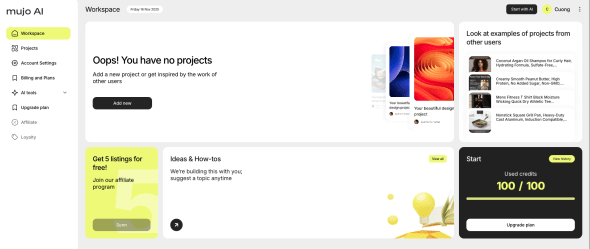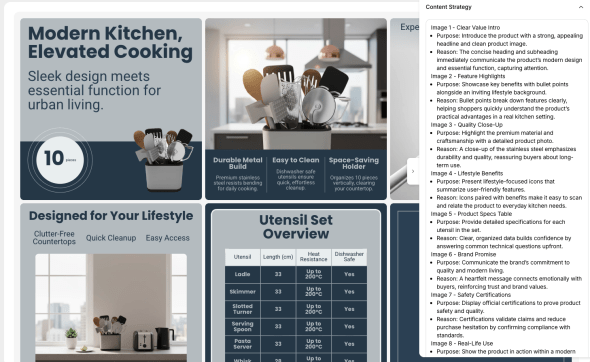Mujo AI: Create Amazon Ready Product Listings in Seconds
Mujo AI is a content automation agent that turns a single product image into a complete visual gallery and listing copy for marketplaces. As an ai product listing generator, it was developed by a team with a background in advertising agencies, including founder Nikolai Muravev, and launched in 2025 to make e-commerce workflows more efficient. This AI represents a significant new entry for online sellers.
The platform is made for e-commerce sellers, marketers, designers, and brand teams on platforms like Amazon, Shopify, and Etsy. Its main purpose is to address the time-consuming and costly process of creating high-quality product listings.
Mujo AI automates visual and copy creation, aiding in compliance with marketplace rules and improving search rankings. It reduces the need for manual design work and copywriting, letting brands launch products faster.
Best Use Cases for Mujo Product Listing AI
- Amazon/Shopify/Etsy Sellers: For small to medium-sized sellers, Mujo AI automates the creation of compliant and conversion-focused product listings. AI tools for Amazon sellers are becoming essential, and this tool addresses that need directly. It generates entire visual galleries and persuasive copy from one product image, greatly reducing the time and cost to go live. This function helps sellers create Amazon ready product listings with AI by handling both visuals and text, improving overall listing quality.
- E-commerce Agencies & Brand Designers: Agencies can use Mujo AI to scale their content creation for multiple clients. The tool’s bulk management and template features permit the rapid production of on-brand assets across entire product catalogs. This improves operational efficiency and allows designers to focus on high-level creative strategy rather than repetitive production tasks.
- Direct-to-Consumer (DTC) Brand Owners: The AI helps DTC brands accelerate their product launch cycles. By handling the technical requirements for visuals and copy, it helps listings meet algorithm suggestions and platform compliance from day one. This can lower marketing spend, minimize the risk of listing rejection, and help reduce product return rates caused by unclear descriptions.
- Marketplace Managers: For teams managing hundreds or thousands of SKUs, the bulk processing function in the platform is highly effective. It can update and catalogue entire product lines in minutes, promoting consistency and quality across the board. The Compliance Engine automatically adjusts content to meet the specific image and text rules of different marketplaces, saving many hours of manual work.
Rapid Onboarding & Ease of Use: The platform features a simple, no-code workflow that allows users to generate content in minutes without any design or prompt engineering skills.
Noticeable Time & Cost Savings: Mujo AI automates tasks that traditionally require designers and copywriters, offering considerable cost savings compared to manual methods.
Automated Marketplace Compliance: Its built-in Compliance Engine is designed to adhere to the complex image and text specifications of major platforms like Amazon and Shopify.
Capable Bulk Processing: Users can update or create listings for entire product catalogs simultaneously, greatly improving efficiency for brands with large inventories.
AI-Powered Buyer Persona Detection: The Mujo Engine analyzes products to identify target buyer profiles and generates content fitted to their priorities and interests.
No-Code Customization: The tool includes a drag-and-drop builder, premade templates, and a Design System for applying brand styles without writing code.
Generous Free Plan: A free "Start Plan" and a free trial without a credit card requirement make it accessible for anyone to test its core functions.
Limited Advanced Branding Control: For large enterprises with very strict brand guidelines, the customization options may not be granular enough to replace high-end custom creative work.
Potential Layout Limitations: While versatile, the template-based system may not accommodate highly unique or complex visual layouts required by some luxury brands.
Learning Curve for Advanced Features: Although the basic interface is simple, mastering the full suite of features for fine-tuned batch edits can take some time.
Newcomer in the Market: As a recently launched tool, it lacks the extensive public case studies and long-term track record of more established competitors.
-
AI Visual & Copy Generation: Automatically creates complete visual galleries and listing copy (titles, bullet points, descriptions) from a single product image.
-
Mujo Engine: An underlying AI that analyzes products, identifies key features, and detects ideal buyer profiles to generate tailored content.
-
Bulk Management: A core function for updating, creating, and managing listings for hundreds or thousands of products in a single workflow.
-
Premade Templates & Smart Layouts: A library of pre-built, conversion-tested designs for product galleries that can be customized easily.
-
Drag-and-Drop Builder: An intuitive interface for arranging and modifying visual elements without needing design software like Photoshop.
-
Design System: Allows users to save brand styles, colors, and themes to maintain consistency across all product listings.
-
Compliance Engine: Automatically handles technical requirements like image safe zones, resolution, and content rules for different marketplaces.
-
No-Code Workflow: The entire process is designed to be accessible to non-technical users, with no prompt engineering or coding required.
-
Cloud-Based Execution: All processing is handled in the cloud, requiring no software installation and enabling fast bulk operations.
-
Platform-Specific Tuning: Generates content refined for the search algorithms and user expectations of specific marketplaces like Amazon, Etsy, and Shopify.
 Dashboard
Dashboard
 Product Image Created By AI
Product Image Created By AI
 AI Product Listing Generator
AI Product Listing Generator
Frequently Asked Questions
-
What is Mujo AI?
Mujo AI is a web-based AI agent that automates the creation of e-commerce product visuals and listing copy from a single image. -
Who should use Mujo AI?
The tool is best for e-commerce sellers, agencies, marketplace teams, and digital marketing designers who need to create quality listings quickly. -
Does Mujo AI require technical skills?
No, Mujo AI offers a no-code workflow and does not require any design skills or prompt engineering experience. -
Which e-commerce platforms does Mujo AI support?
Mujo AI generates content compliant with major marketplaces, including Amazon, Shopify, Etsy, and Lazada. -
Is there a free trial for Mujo AI?
Yes, Mujo AI offers a free “Start” plan and a free trial for its paid tiers, with no credit card required to begin. -
Can Mujo AI handle large product catalogs?
Yes, its bulk management feature is specifically designed to process hundreds or thousands of SKUs at once. -
What are the main limitations of Mujo AI?
Its primary limitations are in deep brand customization for luxury products and advanced layout flexibility compared to a manual designer. -
Can AI create Amazon listings?
Yes, AI can create Amazon listings. Tools like Mujo AI are designed as ai product listing generators to produce all necessary components, including titles, bullet points, descriptions, and the visual gallery, tailored to Amazon’s guidelines. -
Does Amazon accept AI-generated content?
Yes, Amazon’s policies permit AI-generated content for product listings, provided the content is accurate, not misleading, and adheres to all selling policies. The responsibility for the content’s accuracy always rests with the seller. -
Can you use AI to sell on Amazon?
Yes, you can use AI in many aspects of selling on Amazon. AI can help with creating listings, managing inventory, and optimizing advertising campaigns. Tools like Mujo AI focus on the content creation part, helping you create Amazon ready product listings with AI. -
How to use AI to create a product label?
While Mujo AI focuses on digital e-commerce listings, other specialized AI design tools can create product labels. The process involves using an AI image generator, providing it with prompts about your brand, product, and desired style. The AI then generates design concepts you can refine for printing.
Tech Pilot’s Verdict
I’ve analyzed the capabilities of Mujo AI based on its stated features and early user feedback to see if it accomplishes its goal of one-click e-commerce content automation. My objective was to determine if this AI agent could effectively replace the manual, time-intensive workflows that affect so many online sellers. The growth of ai for e commerce has been substantial, and this tool fits directly into that category.
First, I looked at the core feature: the AI visual and copy generator. For this, I imagined uploading a single, clean product photo—say, a new kitchen gadget on a transparent background. According to the data, the engine in Mujo AI analyzes the product and generates a full gallery with lifestyle images, infographics, and feature callouts. At the same time, it writes SEO-friendly titles, bullet points, and descriptions. The speed here is the critical advantage. A process that normally takes a designer and a copywriter hours is condensed into minutes.
Next, I considered the bulk management feature. This is where the tool appears to be most useful for established brands or agencies. I pictured a scenario where a brand needs to update 500 product listings for a seasonal sale. Instead of editing CSVs and manually uploading images, a user could apply a new template or copy update across the entire catalog in a single operation. This scalability is a large part of its value and directly addresses a major difficulty in e-commerce operations.
Of course, the tool has its limits. Feedback suggests that while it’s excellent for most standard e-commerce needs, it may fall short for high-end luxury brands that require bespoke, artistic layouts. This is not a failure of the tool but a definition of its target market: sellers and high-volume teams who prioritize speed and compliance over minute creative control. The pricing, which includes a free entry point, aligns with this audience.
Top Alternatives to Mujo AI
-
Naper.ai: Naper.ai is a strong alternative for users who operate exclusively on Shopify. It offers deep integration with the Shopify admin panel for SEO and content management. While Mujo AI provides a more extensive, platform-agnostic visual generation suite, Naper.ai is likely the better choice for merchants who need to fine-tune their Shopify SEO through a native-like interface.
-
RankingKoala: This tool is an excellent choice if your primary goal is SEO-focused text content, such as product descriptions and blog posts. RankingKoala specializes in keyword usage and creating content intended to rank high on search engines. It lacks the visual and image gallery generation that is central to Mujo AI. RankingKoala is ideal for content marketers, whereas Mujo AI serves e-commerce managers who need a complete visual and text package.
-
Quicklisting: Quicklisting focuses on automating submissions to online directories, making it a tool for market expansion and local SEO. Its core strength is distributing business information, not creating the visual product assets themselves. It does not generate visual galleries or e-commerce-specific copy. Quicklisting is a better fit for businesses focused on building local presence, while Mujo AI is purpose-built for creating product listings on marketplaces.
In summary, Mujo AI stands out as a complete tool for product listing creation. While alternatives focus on specific areas like Shopify SEO or text generation, the strength of Mujo e-commerce AI is its ability to combine visual design, copywriting, and compliance into a single, automated workflow. For any e-commerce seller looking to scale operations and launch products faster, it presents a compelling case.

